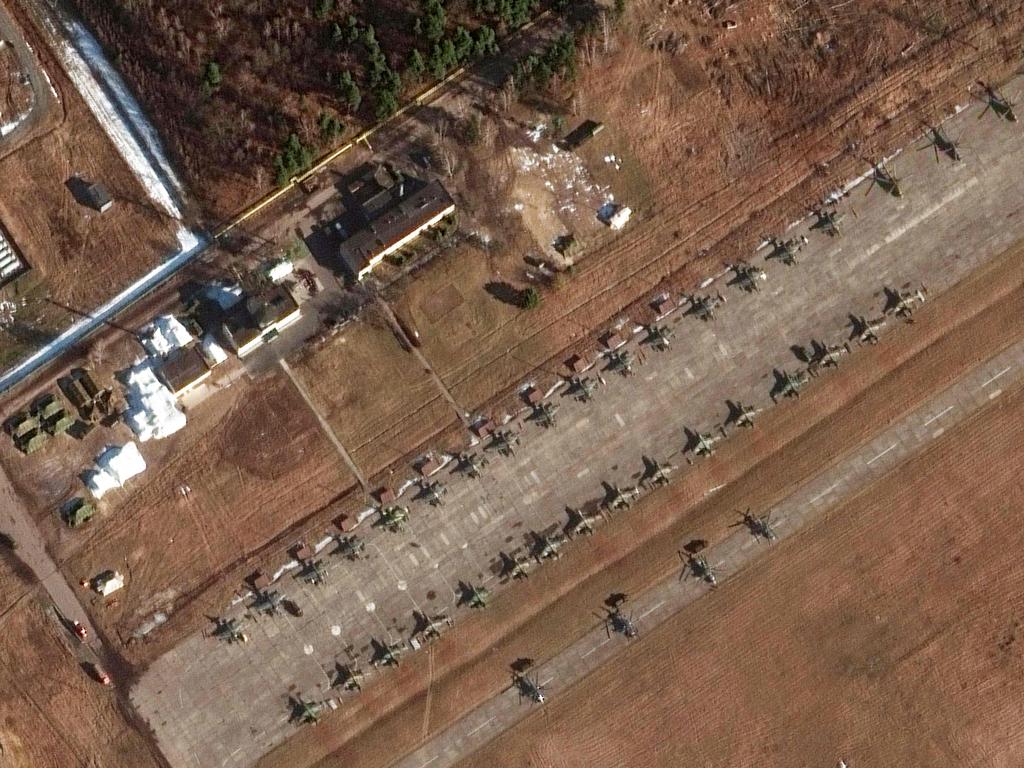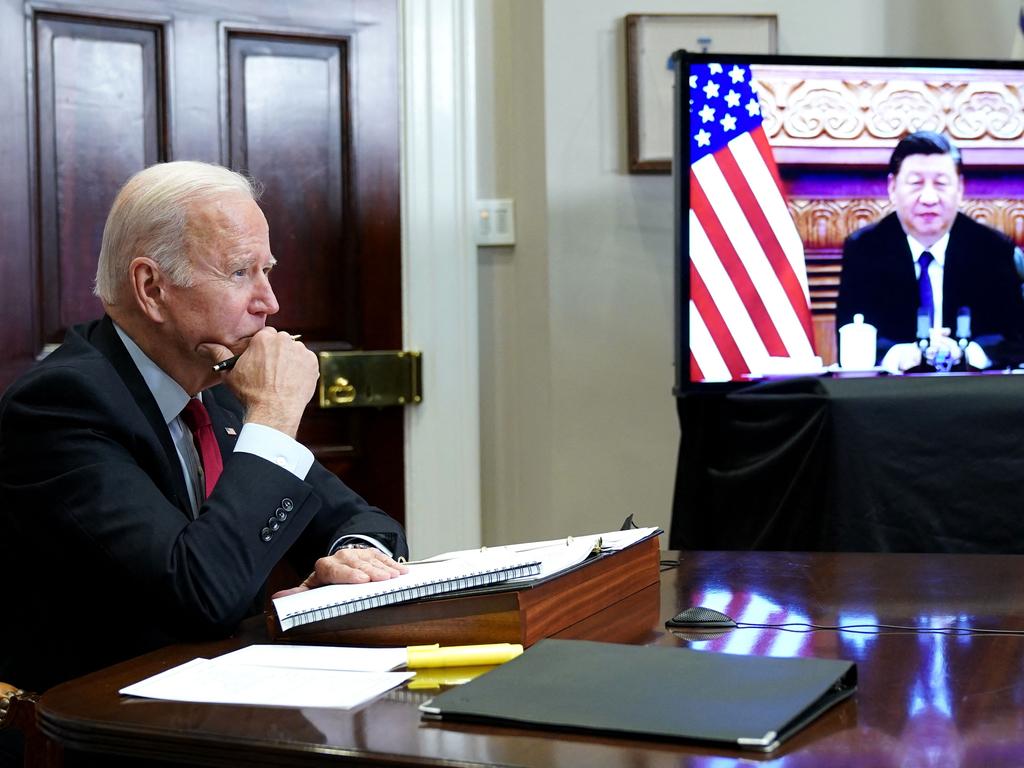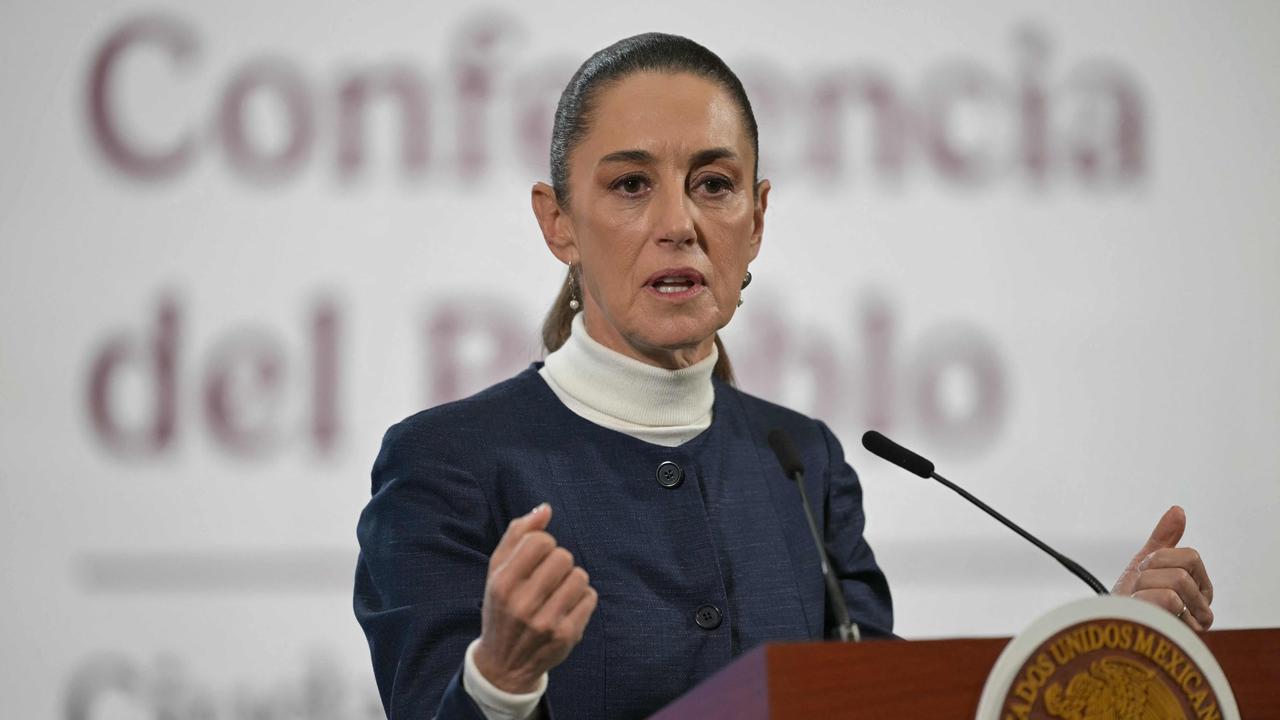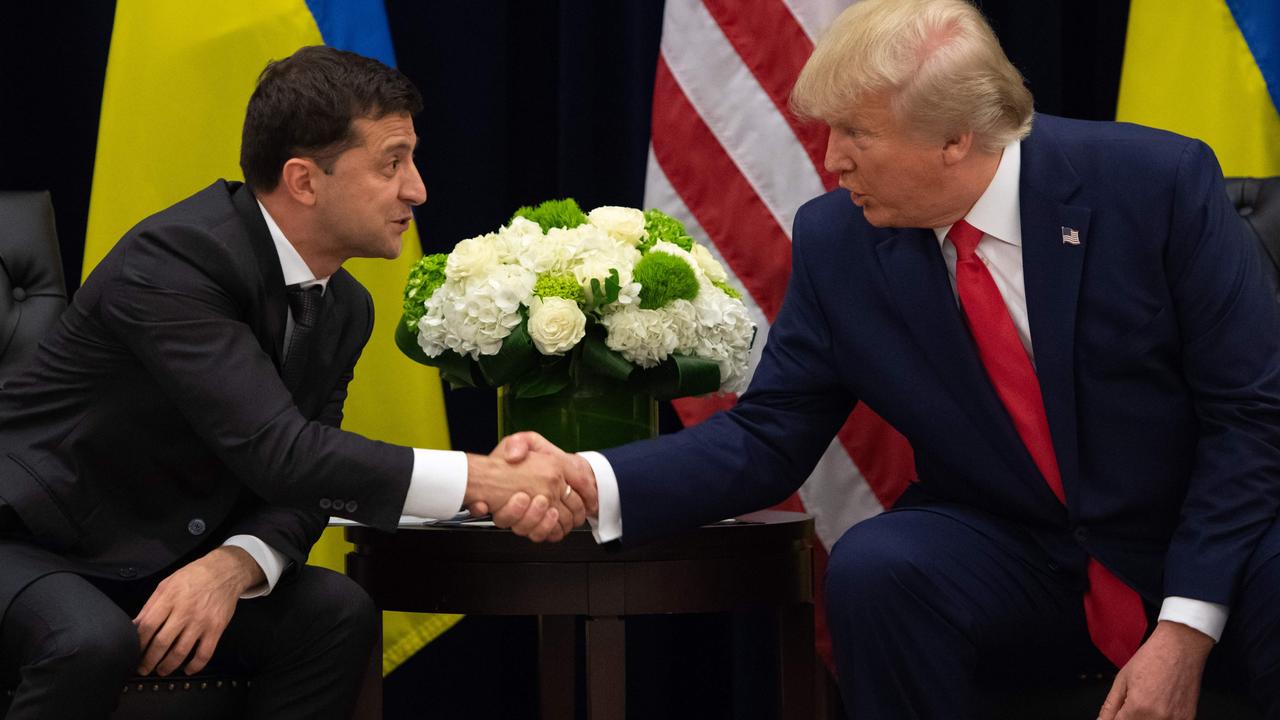Macron talks Ukraine with Putin, then calls Zelensky as Russia extends troops in Belarus
Emmanuel Macron has called Vladimir Putin in an attempt to halt the invasion of Ukraine, whose leader urged an immediate ceasefire.
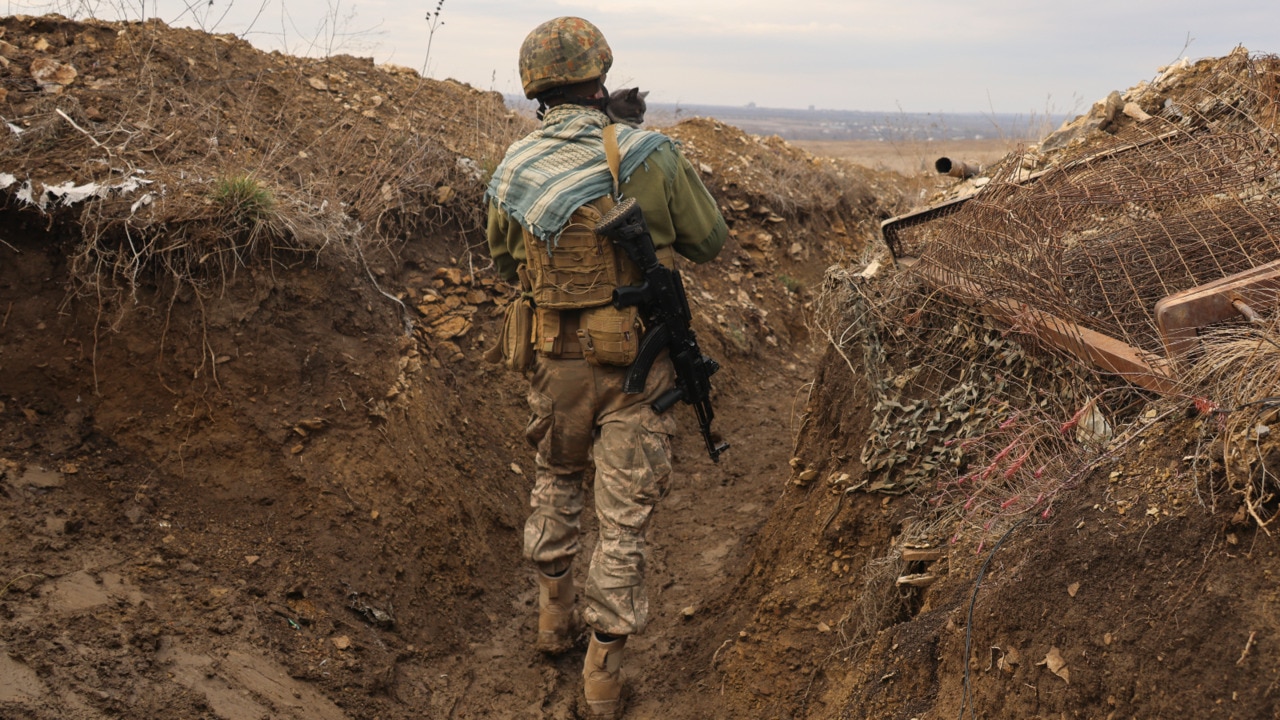
French President Emmanuel Macron and Russian leader Vladimir Putin on Sunday agreed to work for a ceasefire in eastern Ukraine, Mr Macron’s office said.
In a phone conversation lasting 105 minutes, they also agreed on “the need to favour a diplomatic solution to the ongoing crisis and to do everything to achieve one”, the Elysee said, adding that French Foreign Minister Jean-Yves Le Drian and his Russian counterpart Sergei Lavrov would meet “in the coming days”.
Mr Putin and Mr Macron said they would work “intensely” to allow the Trilateral Contact Group, which includes Ukraine, Russia and the OSCE, to meet “in the next few hours with the aim of getting all interested parties to commit to a ceasefire at the contact line” in eastern Ukraine where government troops and pro-Russian separatists are facing each other.
“Intense diplomatic work will take place in the coming days,” Mr Macron’s office said, with several consultations to take place in the French capital.
Mr Macron and Mr Putin also agreed that talks between Russia, Ukraine, France and Germany should resume to implement the so-called Minsk protocol which in 2014 had already called for a ceasefire in eastern Ukraine.
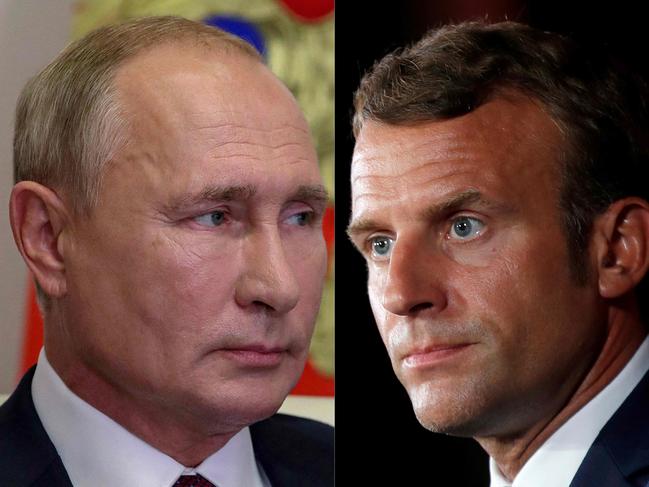
Both also agreed to work towards “a high-level meeting with the aim of defining a new peace and security order in Europe”, Mr Macron’s office said.
Ukrainian President Volodymyr Zelensky, after a phonecall on Sunday with his French counterpart, called for a resumption of talks with Russia under OSCE auspices and an immediate ceasefire.
“We stand for intensifying the peace process. We support the immediate convening of the TCG,” he said, referring to the Trilateral Contact Group, which includes Ukraine, Russia and the OSCE.
It comes as Mr Macron called Mr Putin in a last-ditch effort to avert a Russian invasion of Ukraine.
The call, which lasted 105 minutes, came two weeks after Mr Macron went to Moscow to persuade Mr Putin to hold back from sending troops massed on the border into Ukraine.
It represented “the final possible and necessary efforts to avoid a major conflict in Ukraine,” the Elysee said ahead of the conversation.
The call came a day after Ukrainian President Volodymyr Zelensky told Mr Macron that he would not respond to what he called Russia’s “provocations”, according to the Elysee, and remained open to “dialogue” with Moscow.
But in a speech to the Munich Security Conference he also called on western governments to stop what he said was “a policy of appeasement” towards Mr Putin.
After the conversation with Mr Putin on Sunday, Mr Macron went on to talk with Mr Zelensky on the telephone, the French presidency said.
It comes as an estimated 30,000 Russian troops will stay longer in Belarus, which borders Ukraine. Joint exercises had been scheduled to end on Sunday, but the Belarusian defense minister has now said the drills will continue beyond the weekend.
The US has long warned that this large-scale military deployment is a pretext for building an invasion.
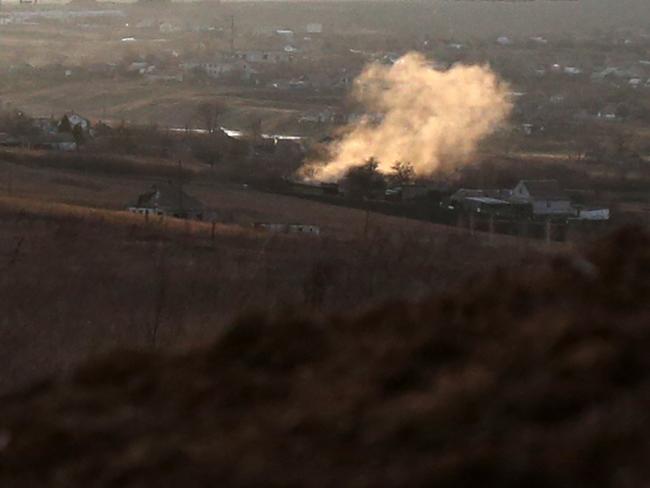
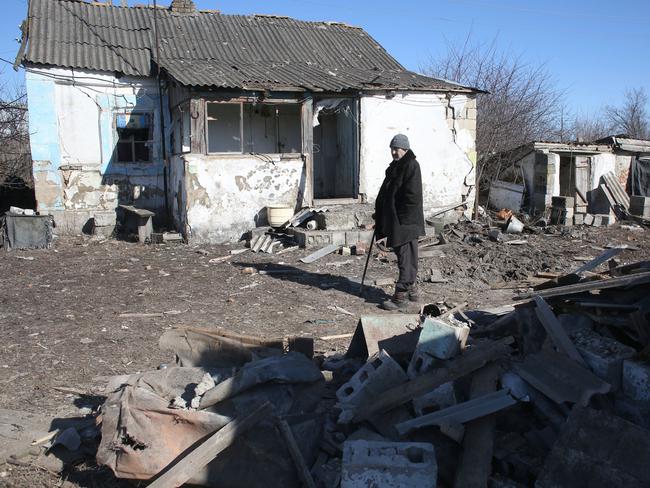
On Saturday, local time, Russia’s national security service reported two mortar shells landed on a building inside Russian territory as they claim Ukraine forces have begun a campaign of “genocide” against any Russian-speaking citizens.
Hostilities between Ukraine forces and Russian-backed separatists in Ukraine’s east have ramped up in recent hours with analysts now predicting the eight-year border conflict will be the precursor to all over hostilities.
It comes as US Vice President Kamala Harris told European leaders at a summit in Munich, the world had arrived at “a decisive moment in history” as President Joe Biden convenes an emergency national security council meeting to discuss Russia “poised” for attack.
The fears come as Ukrainian-Australians held rallies and dedicated church services across Australia on Sunday to send “a message” to Russian President Vladimir Putin.
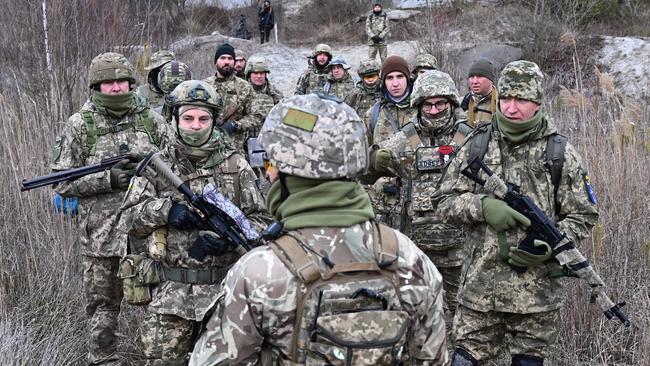
As claims and counter claims of shelling along the Russian-Ukrainian border rang out President Putin watched a bank of screens in the Kremlin’s “Situation Room” showing his troops testing nuclear-capable short range missiles.
The footage was beamed to households across Russia in a show of strength as the president sought domestic support for possible war.
“All the missiles hit their targets, confirming their performance objectives,” the Kremlin said, adding that the drills included Tu-95 bombers and submarines.
Earlier, Kremlin spokesman Dmitry Peskov had made a reference to nuclear launch codes.
“Such test launches, of course, are impossible without the head of state. You know about the famous black suitcase and the red button,” he said.
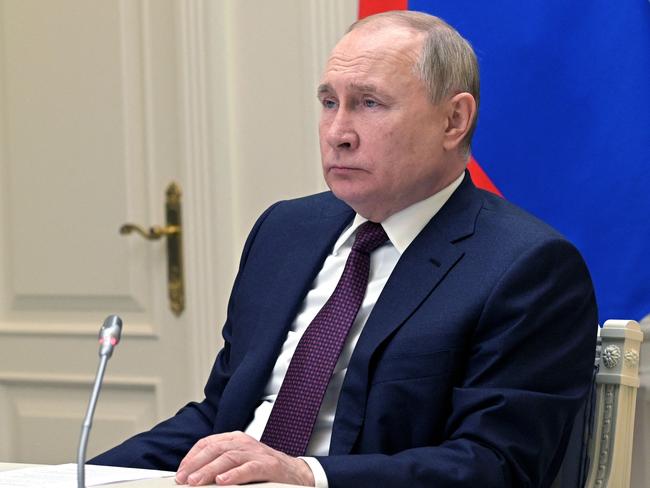
Russia’s FSB security services meanwhile reported two shells that landed in the Rostov area in Russia were Ukrainian and while no-one was hurt it claimed was part of a broader campaign. The Ukraine military quickly dismissed the report but said mercenaries and Russian Special Forces had moved into separatist-held parts of east Ukraine to provoke all out hostilities.
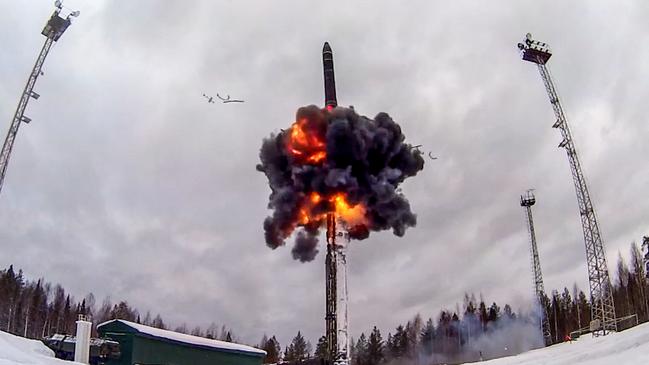
The separatists had also made a high-profile media show of civilian evacuations from Ukraine’s east that the rebels themselves had organised as they claimed to have intercepted secret Ukraine plans to “purge” Russian-speakers from the disputed territory.
A man detained in Donetsk in Ukraine’s east was paraded on Russian television claiming to be a spy and admitting the border city was set to be levelled by mortar fire.
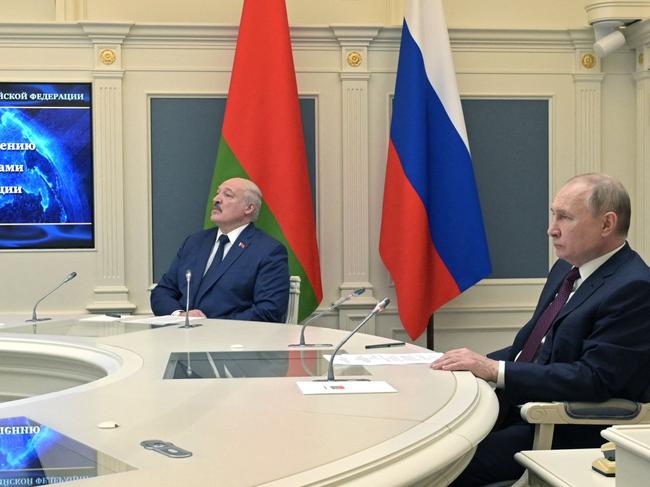
Russia annexed Ukraine’s Crimean Peninsula in 2014 and fomented a rebellion in eastern Ukraine, where pro-Russia separatists have been fighting Ukrainian forces for almost eight years. Shelling killed two Ukrainians soldiers on Saturday.
Western leaders meanwhile gathered in Munich for talks.
Kamala Harris told Ukraine’s leader President Volodymyr Zelensky the world was watching.
“Let me be clear, I can say with absolute certainty: If Russia further invades Ukraine, the United States, together with our allies and partners, will impose significant and unprecedented economic costs,” Harris said.
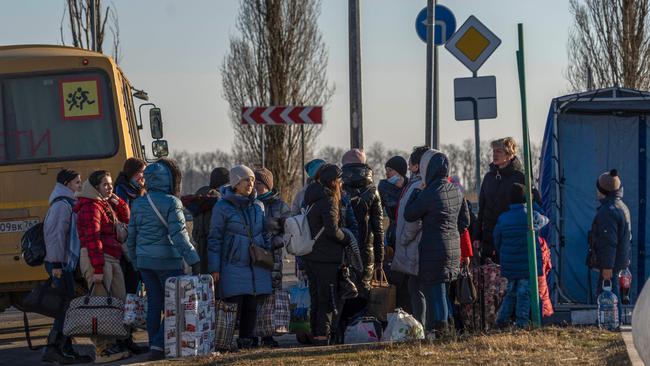
Mr Zelensky responded calling on the world to do more in the face of Russian aggression.
“For eight years, Ukraine has been a shield,” he said. “For eight years, Ukraine has been holding back one of the greatest armies in the world.”
He said it was now time for “clear, feasible time frames” for Ukraine to join the US-led NATO military alliance, the very thing the Kremlin has said was a red line for its security. President Putin sought a signed guarantee Ukraine would never be allowed into NATO before he would consider pulling back his troops.
SOLDIERS KILLED IN UKRAINE
Ukraine’s army said on Saturday that two of its soldiers died in attacks in on the frontline with Russian-backed separatists, the first fatalities in the conflict in more than a month.
“As a result of a shelling attack, two Ukrainian servicemen received fatal shrapnel wounds,” the military command for the separatist conflict said.
Top Ukrainian officials reportedly also came under a shelling attack on Saturday, local time, during a tour of the front of the separatist conflict in Ukraine.
A dozen mortars exploded within a few hudred metres of Ukraine’s interior minister as he met journalists on a tour of the frontline with Russian-backed rebels.
The minister, Denys Monastyrskiy, was forced to seek cover as the shells exploded, shortly after he gave on camera interviews to international media, AFP correspondents reported.
There was no sign that anyone was hurt in the volley of shells, which fell as the minister left a frontline area where he had given interviews in the trench line separating government forces from the rebels.
Moscow-backed rebels who hold parts of the Lugansk and Donetsk districts on the Russian border have alleged that the government is plotting a campaign to drive them out of the area.
But Kyiv insists it has no such plan, and in turn accuses Russian leader President Vladimir Putin of ramping up tensions to provoke an incident that could serve as a pretext to launch an invasion.
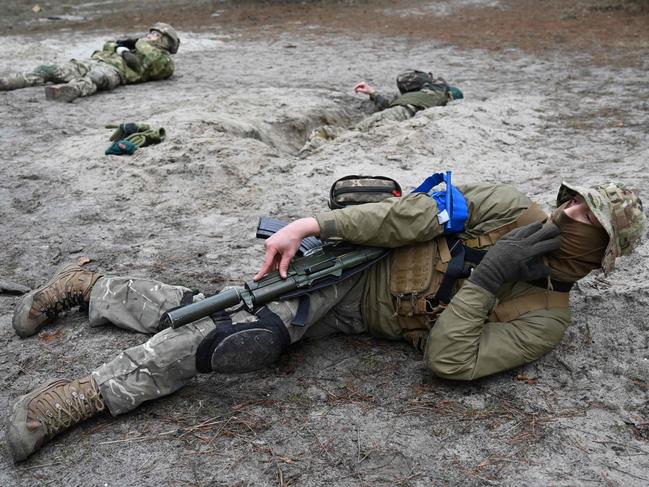
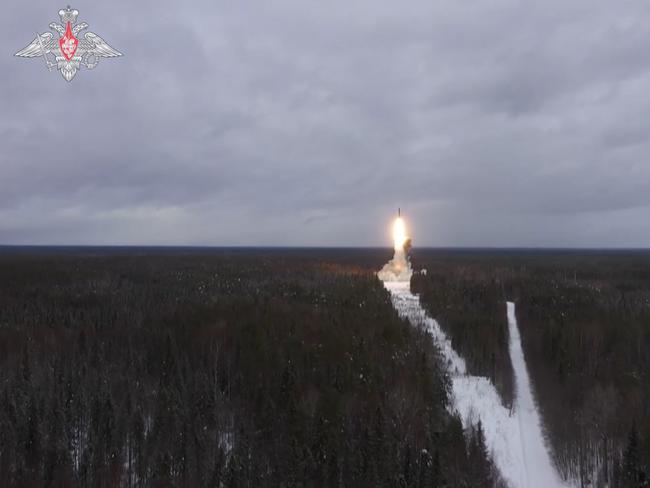
The Kremlin insists it has no plans to attack its neighbour, which has angered Moscow by seeking closer ties with NATO and the European Union.
But Moscow is doing nothing to reduce fears, with state media accusing Kyiv of plotting an assault on the rebel-held pro-Russia enclave in eastern Ukraine.
The United States insists that, with some 150,000 Russian troops on Ukraine’s borders — as many as 190,000, when including the Russian-backed separatist forces in the east — Moscow has already made up its mind to invade.
Some of the Russian forces, around 30,000 troops, are in Belarus for an exercise which is due to end on Sunday. Moscow has said that these forces will return to barracks, but US intelligence is concerned that they could take part in an invasion of Ukraine.
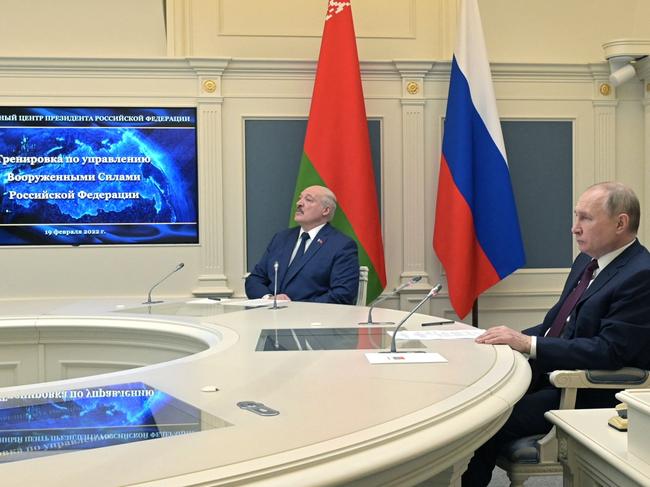
US President Joe Biden said Friday that he was sure Putin had made the call to invade, regardless of warnings that it would trigger huge Western sanctions, and the attack could come in the next days with targets that would include the capital Kyiv.
On Saturday, visiting NATO ally Lithuania, US Secretary of Defence Lloyd Austin said Russian forces “are now poised to strike” and “moving into the right kinds of positions to be able to conduct an attack”.
Russia has announced a series of withdrawals of its forces from near Ukraine in recent days, saying they were taking part in regular military exercises and accusing the West of “hysteria” with claims of an invasion plan.
But Putin has also stepped up his rhetoric, demanding written guarantees that Ukraine will never be allowed to join NATO and that the US-led military alliance roll back deployments in eastern Europe to positions from decades ago.
The volatile frontline between Ukraine’s army and separatists in the Moscow-backed breakaway regions of Donetsk and Lugansk has seen a “dramatic increase” in ceasefire violations, international monitors from the OSCE said.
Hundreds of artillery and mortar attacks were reported in recent days, in a conflict that has rumbled on for eight years and claimed the lives of more than 14,000 people.
Ukraine’s armed forces accused the rebels of a huge new wave of attacks on Saturday, saying there had been dozens of exchanges of fire by 7:00am (11:00pm AEST), with one soldier dying from shrapnel wounds.
The soldier, a captain in an intelligence unit, was the fourth Ukrainian soldier to die in the first seven weeks of this year. At least 66 were killed in 2021, according to official sources.
The rebels, who also accused Ukrainian forces of new attacks on Saturday, declared general mobilisations in the two regions, calling up men to fight even as they announced mass evacuations of women and children into Russia.
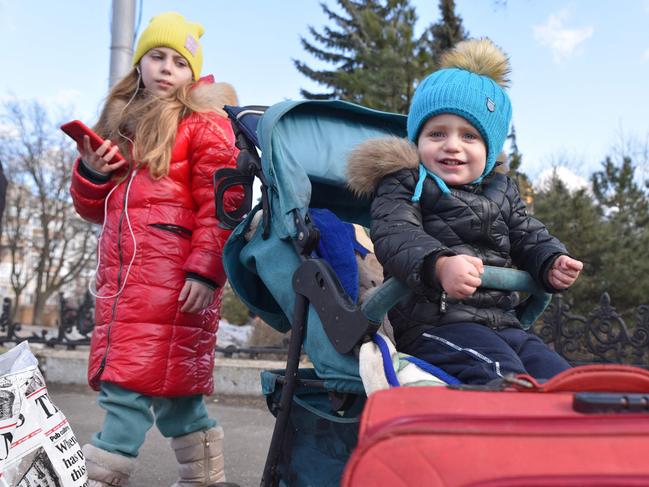
The governor of the neighbouring Russian region of Rostov declared a state of emergency as the first busloads of several thousand crossed the border, followed by Russian state media camera crews.
Moscow and the rebels have accused Kyiv of planning an assault to retake the regions, claims fiercely denied by Ukraine and dismissed by the West as part of Russian efforts to manufacture a pretext for war.
Russia’s Investigative Committee, which probes major crimes, said it had opened an investigation into media reports that a shell fired by Ukrainian forces exploded about a kilometre across the border in Russia’s Rostov region.
Russian news agencies earlier quoted anonymous sources as saying the shell had landed in the region but had not caused any injuries or damage.
Despite the invasion warnings, Zelensky’s office said he would not change plans to personally attend Saturday’s Munich Security Conference.
WESTERN ALLIES CONDEMN RUSSIA
Prime Minister Scott Morrison has said Russia invading the Ukraine is “looking regrettably inevitable”, as EU chief Ursula von der Leyen accused Russia of making a “blatant attempt to rewrite the rules of the international order”.
In a speech lashing out at Moscow over its troop build-up on the Ukraine border, she charged Russia, like China, with seeking to “replace the existing international rules — they prefer the rule of the strongest to the rule of law, intimidation instead of self-determination.”
British Prime Minister Boris Johnson used a speech at the Munich Security Conference on Saturday to demand Western “unity” over Russia’s threats to Ukraine.
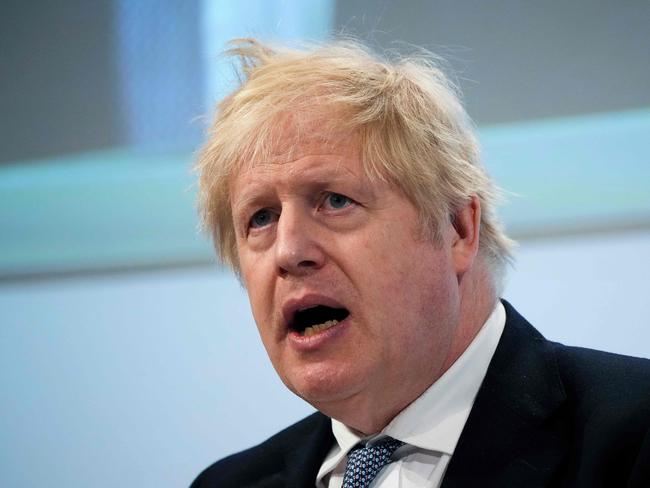
Russian military action against Ukraine would trigger sanctions that would make it “impossible” for Moscow to access the City of London’s deep capital markets, he also
“We must be united against that threat because we should be in no doubt what is at stake here,” Mr Johnson told leaders and ministers gathered for the high-profile conference, which Russia is boycotting.
“If Ukraine is invaded, the shock will echo around the world,” he added, warning in particular of the impact on Taiwan, shortly after Chinese foreign minister Wang Yi addressed the conference.
Russian success in such an invasion would send the message to every other power that “aggression pays and that might is right”, he said, urging Europe to commit to “strategic endurance” in its energy policy, diplomacy and military budgets. is also set to deliver a speech at the Munich Security Conference, telling Russians their “sons’ coffins will pile high” if Mr Putin attacks.
Australia’s Foreign Affairs Minister Senator Marise Payne is also at the conference with US Secretary of State Antony Blinken.
Ukrainian President Volodymyr Zelensky has not changed his plans to personally attend Saturday’s Munich Security Conference, his office said, despite US warnings of a Russian invasion.
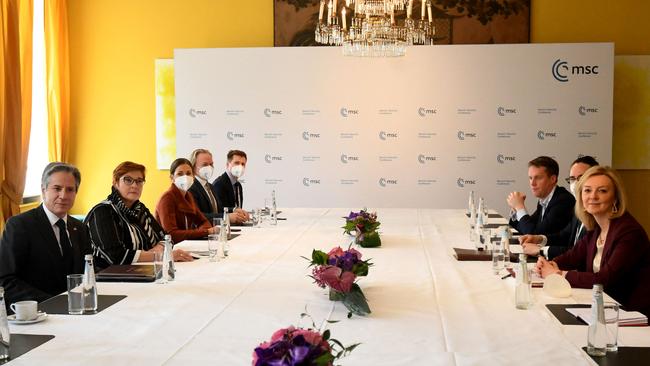
RUSSIA DRAWS BATTLE LINES
Forty per cent of Russia’s forces are now said to be in position to attack, and the US estimates 149,000 Russian troops are on Ukraine’s borders, which could be up to as many as 190,000, when Russian-backed separatist forces are included.
“Forty to fifty per cent are in an attack position. They have uncoiled in tactical assembly in the last 48 hours,” an official insisting on anonymity, said.
Tactical assembly points are areas next to the border where military units are set up.
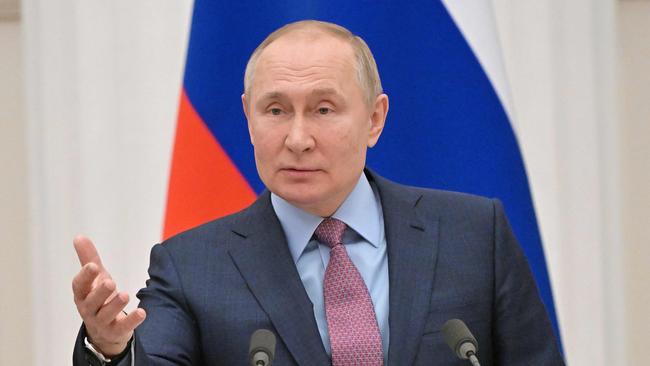
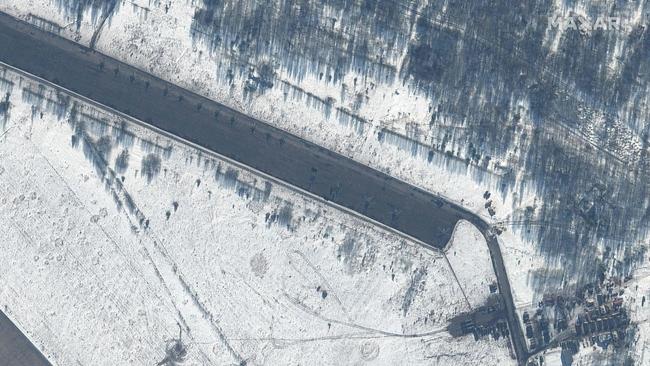
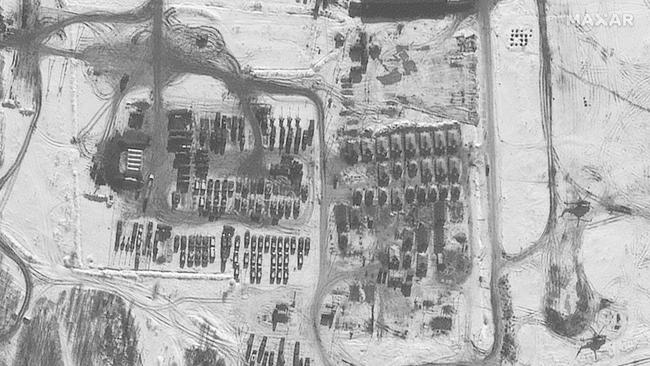
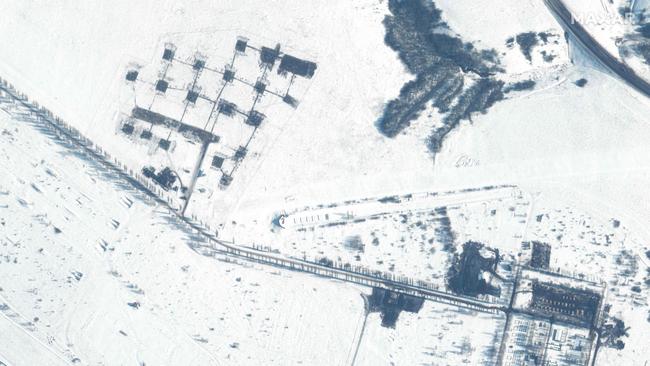
The official said Moscow had massed 125 battalion tactical groups close to the border.
New satellite images also showed a new deployment of helicopters in Belarus with tanks and personnel carriers.
Other pictures appeared to show the Russian military’s ground forces, troop tents and a field hospital, with airfield runways full of ground attack aircraft.
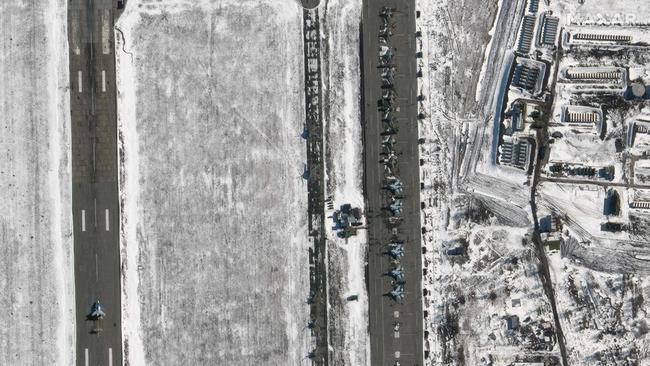
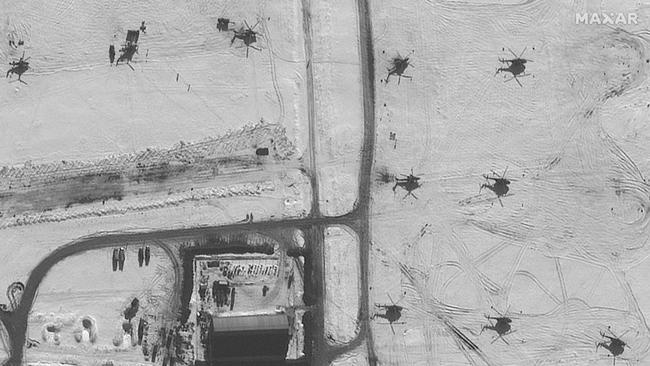
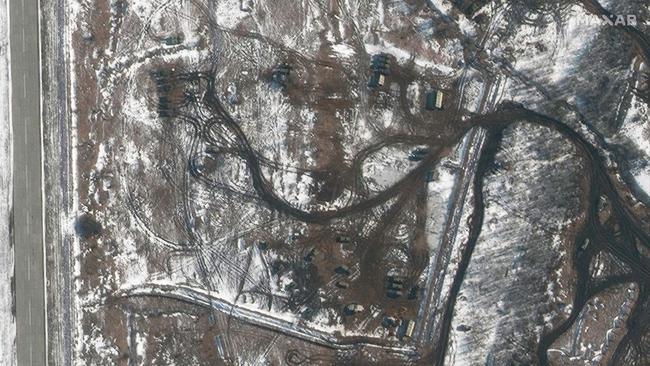
Infantry fighting vehicles and support equipment could also be seen at a military base in Filativka, and a base at Novoozernoye in Crimea.
RUSSIAN NAVY ALSO CLOSES IN
Video released by the Russian Defence Ministry has also revealed a “Moskva” Russian cruiser during the Black sea naval exercises outside the Crimean port of Sevastopol.
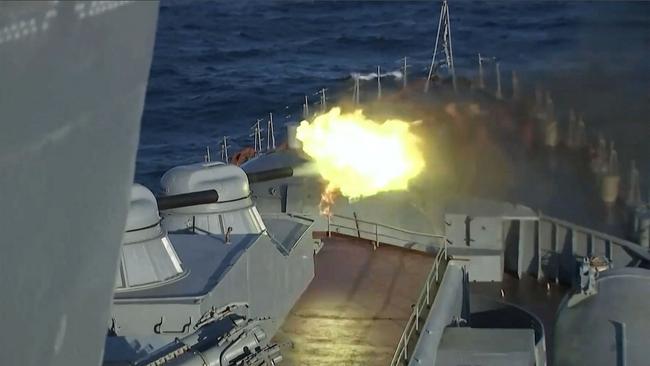
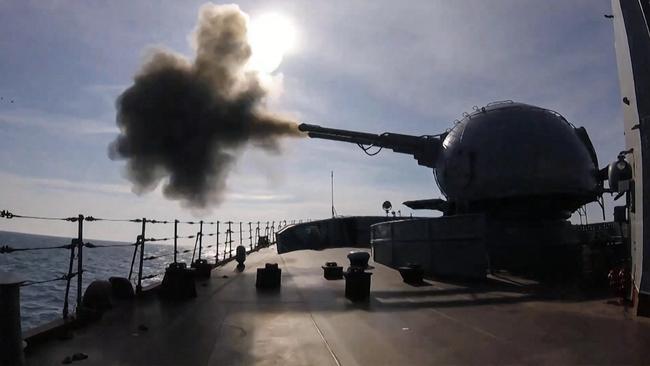
BIDEN: ‘PUTIN HAS MADE UP MIND TO INVADE’
US President Joe Biden said he hoped by revealing Russia’s “plans”, that war could be stopped, after he said he believed Mr Putin had already made up his mind to invade.
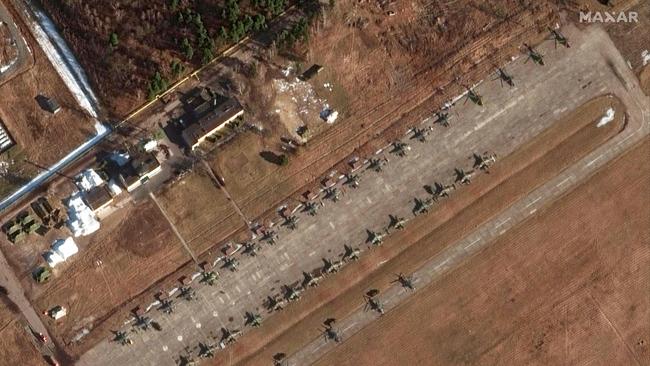
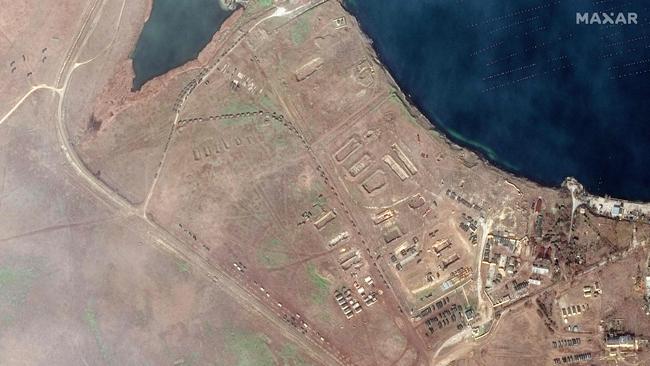
“We’re calling out Russia’s plans. Not because we want a conflict, but because we are doing everything in our power to remove any reason Russia may give to justify invading Ukraine,” he tweeted.
“If Russia pursues its plans, it will be responsible for a catastrophic and needless war of choice.”
Based on “significant intelligence capability”, Mr Biden declared at the White House: “As of this moment, I’m convinced he’s made the decision.”
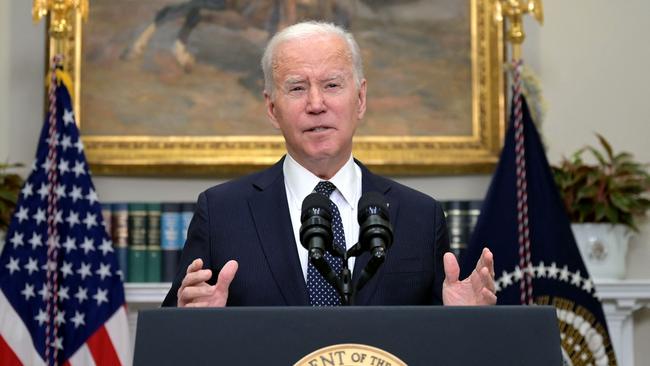
AUSTRALIA: INVASION ‘REGRETTABLY INEVITABLE’
Mr Morrison said Australia would stand by its allies and would provide “support that is necessary” but would not send troops.
“The events in Ukraine continue to be profoundly disturbing,” he said.
“I concur with the statements of so many leaders of free countries around the world that what we are seeing in Ukraine is looking regrettably inevitable.
“We hope that this is not the case. We hope that Russia will step back from its violent threats of intimidation on its neighbour.
“But it does appear, particularly in the reports that we’ve seen, that the likelihood of an invasion of Ukraine by Russia is imminent.”
RUSSIAN SEPARATISTS LAUNCH ATTACKS
Artillery shelling in the east of Ukraine and orders from Russian-backed separatists for civilians to evacuate the region is under way.
Ukraine’s armed forces accused Moscow-backed rebels on Saturday of launching a huge new wave of attacks that have intensified fears of a Russian invasion of its western neighbour.
The joint military command for east Ukraine reported 66 exchanges of fire, a high number compared to recent stages of the conflict — while the rebels called the situation “critical”.
The statement said the rebels had resorted to using banned 82 and 120 millimetre-calibre mortar shells in towns across the front running in the eastern regions of Lugansk and Donetsk.
“There have been no losses among members of the armed forces as a result of the enemy’s attacks,” it said.
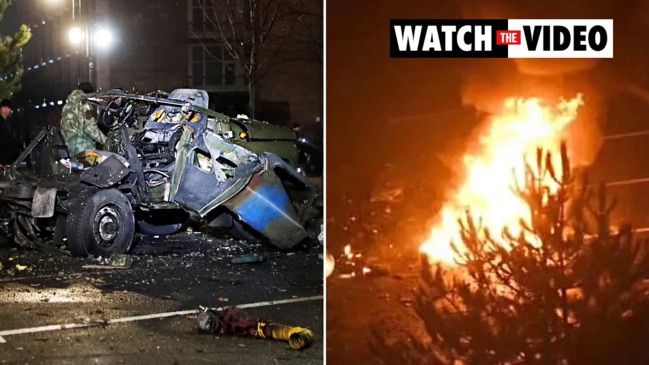
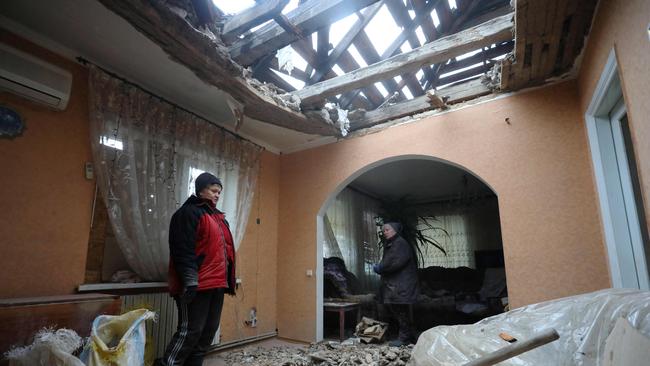
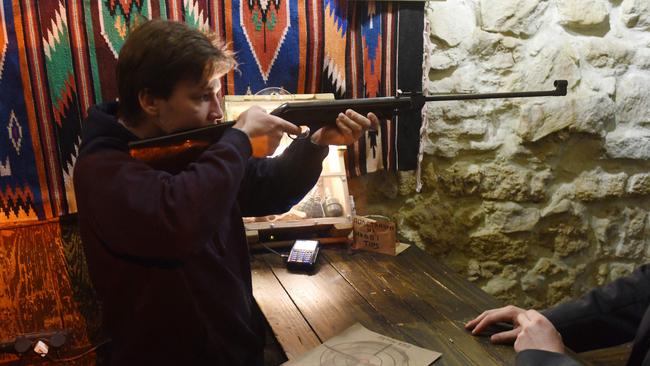
“The armed forces control the situation and continue to perform their mission to rebuff and contain the armed aggression of the Russian Federation.” Moscow formally denies being involved in the conflict and calls it Ukrainian internal affairs.
But monitors from the OSCE European security body have reported regular shipments of Russian weapons across the border throughout the eight-year war.
The rebel leadership in Donetsk on Saturday called the situation “critical” and announced a “general mobilisation”.
The leader in the smaller separatist Lugansk region did the same about an hour later.
Moscow denies it has plans to attack, but is demanding a guarantee that Ukraine will never join NATO and that the Western alliance remove forces from Eastern Europe.

